Bonham, Texas -- May 4, 2010 was a day U.S. Speaker of the House Sam Rayburn would have cherished. It was an occasion that certainly would have brought a smile to H.G. Dulaney, the man Rayburn picked to establish and serve as director at the Speaker's beloved library. So, it was only fitting the both men were recognized at length Tuesday evening when the Sam Rayburn Library was formally designated as a Texas Historical Landmark.
"It is always a great time when we get together at the Sam Rayburn Library, and especially so for this particularly historical occasion," Bonham Mayor Roy Floyd said as he greeted guests in his opening remarks.
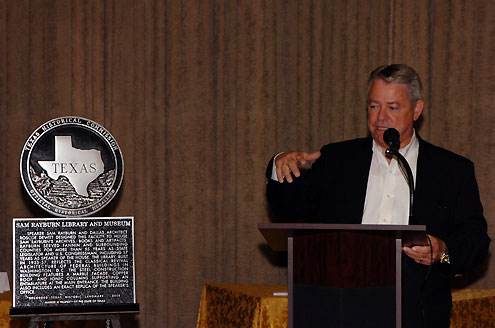 Bonham Mayor Roy Floyd
Bonham Mayor Roy Floyd
One undeniable measure of Rayburn's vision is the fact that his impact continues to be felt across North Texas by travelers on State Highway 121, by veterans served by the VA Center in Bonham that now bears his name, and through countless other worthwhile projects in the 4th District that came about because of Rayburn's guidance and tenacity.
Bonham was a different town when Rayburn presided over a rural version of his Speaker's Office at the Rayburn home and farm west of town. And, even though he died in 1961, Bonham was a different town May 4, 2010 when the Texas State Historian Dr. Light Cummins, Bonham Mayor Roy Floyd, distinguished authors and esteemed historians gathered to celebrate an historical occasion at the Sam Rayburn Library Museum.
"We are all here today because of one man," Dr, Cummins observed as he glanced around the room. "The shadow of Sam Rayburn still falls across Fannin County, just as it does our entire nation."
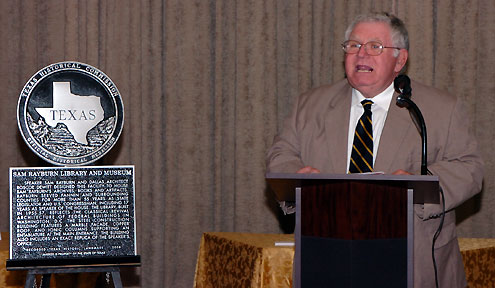 Dr. Light Cummins
Dr. Light Cummins
Dr. Patrick Cox, Associate Director at the Center for American History at the University of Texas at Austin, relayed the feelings of another distinguished historian.
"Dr. Robert V. Remini, the Historian of the House of Representatives and a nationally recognized scholar of American politics, said that Speaker Rayburn's contributions ranked him among the most important Americans in our nation's history," Dr. Cox told the audience. "'Sam Rayburn changed the course of American history,' Dr. Remini stated. The Sam Rayburn Library and Museum is not just a tribute to Speaker Rayburn. The museum stands as a landmark for freedom and democracy that Sam Rayburn cherished."
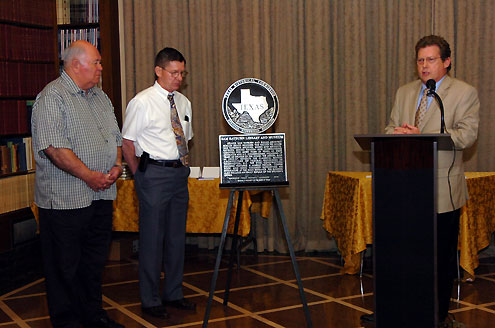 Tom Thornton, Fannin County Historical Commission; Larry Standlee, Fannin County Historical Commission Marker Chairman and Dr. Patrick Cox
Tom Thornton, Fannin County Historical Commission; Larry Standlee, Fannin County Historical Commission Marker Chairman and Dr. Patrick Cox
Dulaney's contribution to that landmark, a landmark now officially recognized by the Texas Historical Commission, went far beyond that of director of the facility. Integrity, loyalty and a heightened sense of service -- characteristics often attributed to Speaker Rayburn -- were mirrored in his faithful employee.
"Over the past half-century, H.G. worked tirelessly and with determined dedication to keep alive the memory of Sam Rayburn and to further the place of the library as an important historical site in Texas," Dr. Cummins remarked. "H.G. met with tens of thousands of visitors to the library and gave tours to a hundred score and more of school groups. Everyone warmed to his infectious grin and hearty laugh. The Sam Rayburn Library and Museum is today as much a reflection of H.G. Dulaney as it is of Congressman Sam Rayburn."
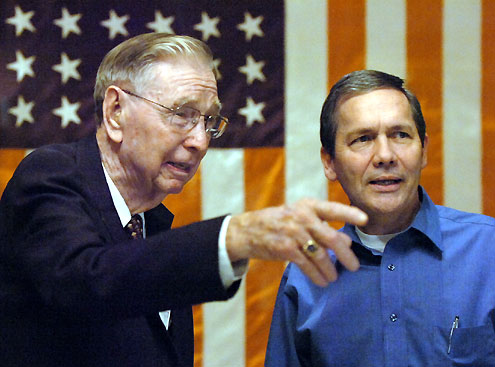 The late H.G. Dulaney (left) visits with Bonham businessman Steve Mohundro at an event at the Sam Rayburn Library several years ago.
The late H.G. Dulaney (left) visits with Bonham businessman Steve Mohundro at an event at the Sam Rayburn Library several years ago.
The Fannin County Historical Commission was instrumental in securing the Texas Historical Marker. Larry Standlee, the commission's marker chairman, and commission member Tom Thornton came forward to present the Texas Historical Marker.
The evening ended with a book signing by Dr. Cox and Collin College professor Michael Phillips, co-authors of The House Will Come to Order, a detailed study of the evolution of the Speaker's role in the Texas House of Representatives, as well as a book signing by Dr. Cummins, author of Emily Austin of Texas, 1975-1851.
Admission is free to the Sam Rayburn Library and Museum. The facility is a division of the Dolph Briscoe Center for American History. For more information, please contact Heather Trent at 903-583-2455 or h.trent@mail.utexas.edu
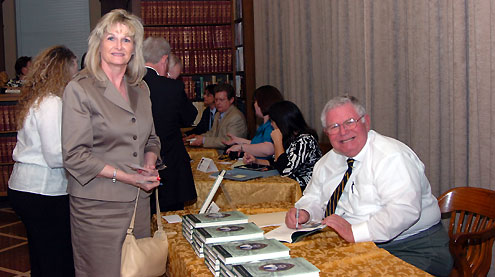 Sharron Cox gets an autographed copy of Emily Austin of Texas, 1975-1851 by Dr. Light Cummins
Sharron Cox gets an autographed copy of Emily Austin of Texas, 1975-1851 by Dr. Light Cummins
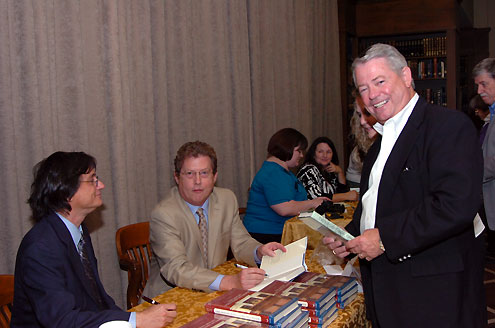 Bonham Mayor Roy Floyd holds a copy of The House Will Come to Order co-authored by Michael Phillips (left) and Dr. Patrick Cox
Bonham Mayor Roy Floyd holds a copy of The House Will Come to Order co-authored by Michael Phillips (left) and Dr. Patrick Cox
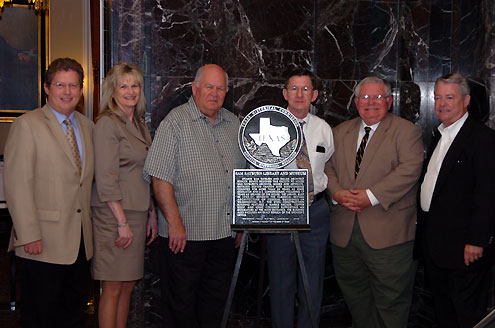 (l-r) Dr. Patrick Cox, Associate Director at the Center for American History at the University of Texas at Austin; Sharron Cox, Friends of Sam Rayburn Board member; Tom Thornton, Fannin County Historical Commission; Larry Standlee, Fannin County Historical Commission; Dr. Light Cummins, Texas State Historian; and Bonham Mayor Roy Floyd
(l-r) Dr. Patrick Cox, Associate Director at the Center for American History at the University of Texas at Austin; Sharron Cox, Friends of Sam Rayburn Board member; Tom Thornton, Fannin County Historical Commission; Larry Standlee, Fannin County Historical Commission; Dr. Light Cummins, Texas State Historian; and Bonham Mayor Roy Floyd
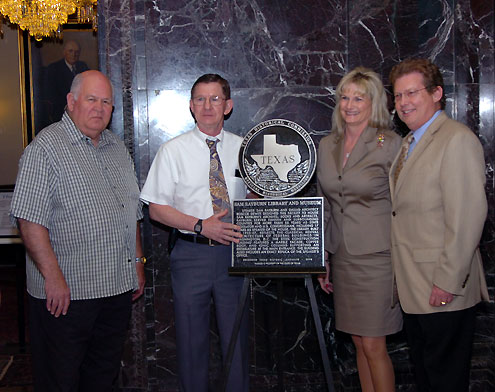 Tom Thornton, Fannin County Historical Commission; Larry Standlee, Fannin County Historical Commission; Sharron Cox, Friends of Sam Rayburn Board member; and Dr. Patrick Cox, Associate Director at the Center for American History at the University of Texas at Austin
Tom Thornton, Fannin County Historical Commission; Larry Standlee, Fannin County Historical Commission; Sharron Cox, Friends of Sam Rayburn Board member; and Dr. Patrick Cox, Associate Director at the Center for American History at the University of Texas at Austin
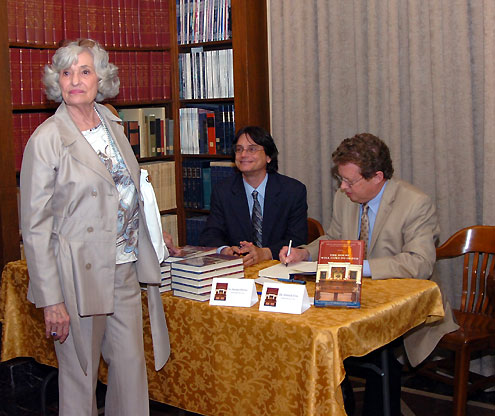 A guest pauses for a photograph as Dr. Patrick Cox signs the book he co-authored with Michael Phillips
A guest pauses for a photograph as Dr. Patrick Cox signs the book he co-authored with Michael Phillips
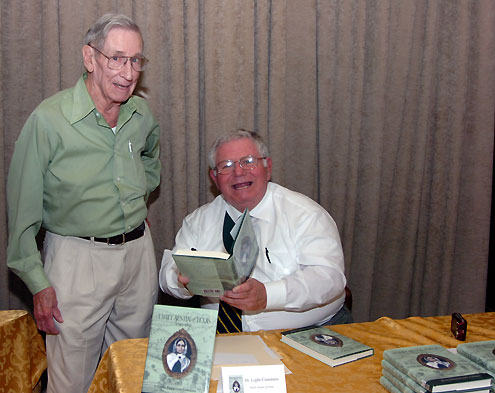 This is more than just a photograph of two of the state's most acclaimed historians; there is an interesting story behind this. When Light Cummins was a sophomore at Tulane University under the tutelage of professor Richard Greenleaf, Cummins mentioned that he wanted to study the history of Spanish missions in Texas. Professor Greenleaf turned, pulled a book from the bookshelf behind him and handed Cummins The San Sabá Mission: Spanish Pivot in Texas by Robert S. Weddle, calling the book "the landmark of historical Texas writing." Tuesday evening in Bonham, it was Mr. Weddle (standing) picking up an historical book written by Dr. Light Cummins, Texas State Historian.
This is more than just a photograph of two of the state's most acclaimed historians; there is an interesting story behind this. When Light Cummins was a sophomore at Tulane University under the tutelage of professor Richard Greenleaf, Cummins mentioned that he wanted to study the history of Spanish missions in Texas. Professor Greenleaf turned, pulled a book from the bookshelf behind him and handed Cummins The San Sabá Mission: Spanish Pivot in Texas by Robert S. Weddle, calling the book "the landmark of historical Texas writing." Tuesday evening in Bonham, it was Mr. Weddle (standing) picking up an historical book written by Dr. Light Cummins, Texas State Historian.
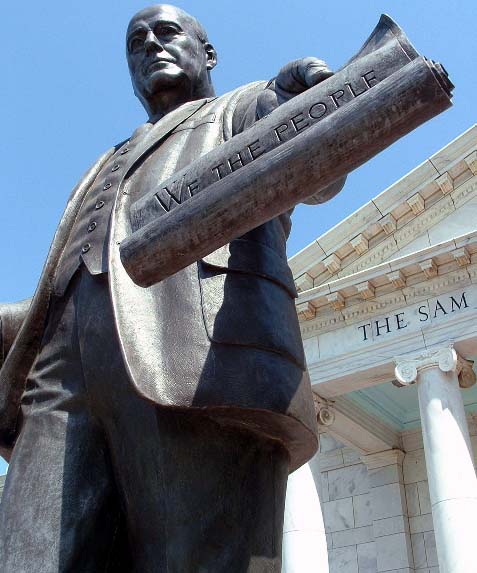 Statue in front of Sam Rayburn Library
Statue in front of Sam Rayburn Library










